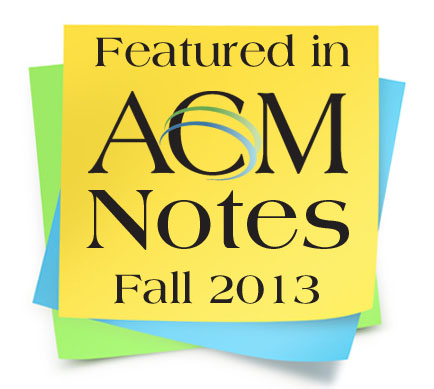“I remember riding to the airport on my last day in Tanzania and thinking ‘This might be it for us, Tanzania, I never know when I’ll see you again,'” said Allison Hamel.
A Lake Forest College graduate, Hamel was recalling the day in late 2010 when she boarded a plane for the U.S. after a semester on the ACM Tanzania: Ecology & Human Origins program.
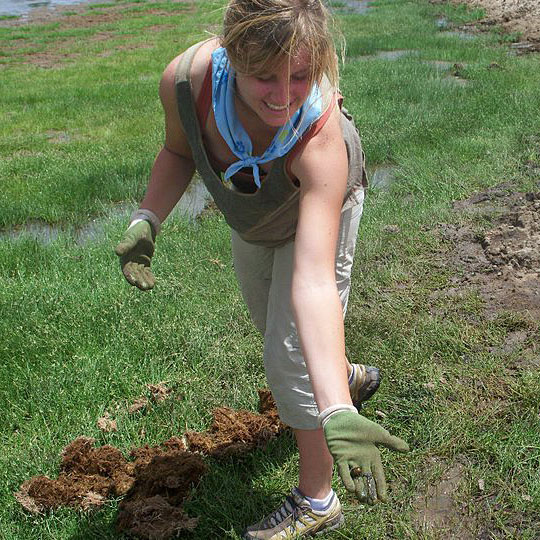 Allison Hamel doing fieldwork in Tarangire National Park as a student on the Tanzania Program in fall 2010.
Allison Hamel doing fieldwork in Tarangire National Park as a student on the Tanzania Program in fall 2010.
As it turns out, her reunion with Tanzania is just around the corner. Next month, Hamel will be back in Dar es Salaam with ACM, but this time as the program’s Student Alumni Fellow, putting her “veteran’s wisdom” to work helping this year’s group of students adjust and thrive in their new surroundings.
Meanwhile, across the Indian Ocean in Pune, India, St. Olaf College graduate Kelsey Gorman will tackle the same role as Student Alumni Fellow for ACM’s India: Culture, Traditions, & Globalization program.
Both will arrive at the program sites about a week before the students, and the first order of business will be planning orientation activities, such as outings to introduce them to local transportation – rickshaws in India and dalla dallas in Tanzania – and to show them how to barter in the markets.
Even using the ATM in another country for the first time can be a bit intimidating, Hamel pointed out. “I’ll be doing a couple of presentations during orientation week about daily life in Tanzania, such as how to interact with people on a daily basis, what to expect from your professors, and to help prepare the students for some of the cultural differences,” she said.
Gorman remembers the difficulties she had adjusting to a new culture on her first arrival in Pune, and is planning to be a “listening ear” for this year’s participants. “Whether it’s homesickness or having a hard time with the attention they’re getting, I can just be there to listen and give advice and talk about what I did, to see if that’s helpful,” she said.
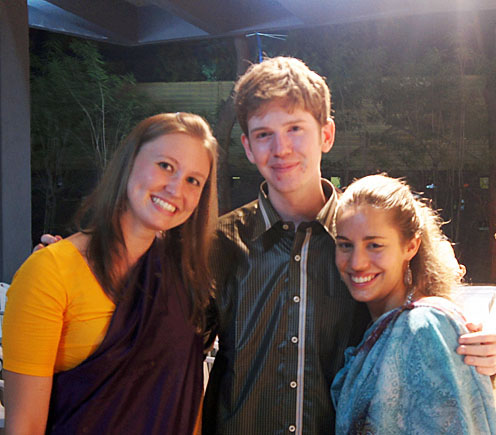 Kelsey Gorman (left) with fellow students on the fall 2011 India Program.
Kelsey Gorman (left) with fellow students on the fall 2011 India Program.
Photo courtesy of Landon Coates Welsh
“In conversation with the other program staff members, I can help find good solutions for the students, whether they’re having problems with their host families or just anxious about something,” Gorman added. “I think I’m just kind of the first line of defense for their worries, because I’ve been there before.”
The position of Student Alumni Fellow was established for the two programs last year with the idea of tapping the knowledge of program alumni to facilitate the experiential aspects of the programs.
“We were looking for ways to help students get involved with organizations and activities beyond the programs’ formal academic content and field trips, so they could meet people and gain a deeper cultural immersion,” said Joan Gillespie, ACM Vice President and Director of Off-Campus Study Programs. “In India, the home stay throughout the semester with a family in Pune is an important part of that immersion, of course, and we’ve encouraged students to take lessons in dance, music, and yoga.”
The fall 2012 Fellows – Laura Heggs in Tanzania and Sarah Fischer in India – were instrumental in broadening the opportunities for students to engage with the local communities, and as a result, students have volunteered with organizations to teach English, work with children in the arts, and other activities.
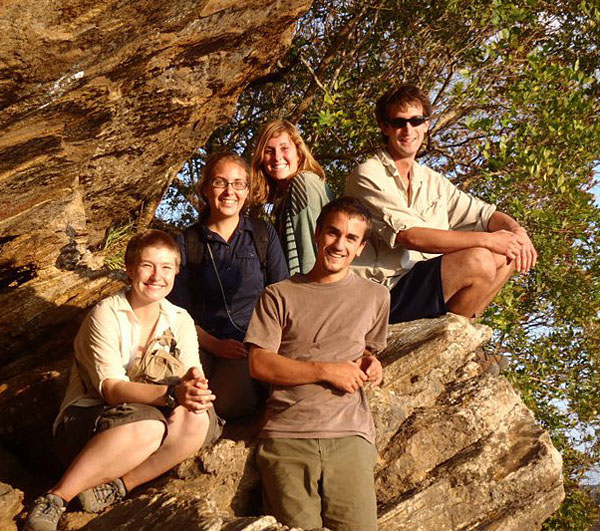 Allison Hamel (back row, center) with friends at Irente Viewpoint in the Usambara Mountains.
Allison Hamel (back row, center) with friends at Irente Viewpoint in the Usambara Mountains.
A focus this fall for Hamel will be scouting out places where students can serve as volunteers, even during the program’s six-week fieldwork phase near Tarangire National Park in the northern part of the country. “They will have a bit of free time when they’re in the field camp, like off days when they’re not going to the fieldwork sites or doing interviews with villagers,” she said.
According to Gillespie, ACM is exploring the possibility of establishing links to longer term community development efforts around Tarangire, such as with local schools, so students each year can continue the volunteer work started by their predecessors.
Along with a variety of courses and language instruction in Kiswahili (Tanzania) and Marathi (India), a major academic component of each program is an independent project completed by every student. Gorman, an environmental studies major, did her project as a student on the effects of Hinduism – India’s most prevalent religion – on people’s environmental attitudes and practices. Along with background research on Hindu traditions, she interviewed Pune residents, which was a good way to meet people. “I made some friendships through [the project] and learned a ton,” she said. “It was a lot of work and an accomplishment that I felt good about.”
In her new role, said Gorman, “I think I can be helpful in giving [the students] advice for how to schedule what they’re going to do with their project and give them ideas for sources and for people to talk to. A lot of the projects are interview-based, so I can help them brainstorm who they can talk to and how they can network.”
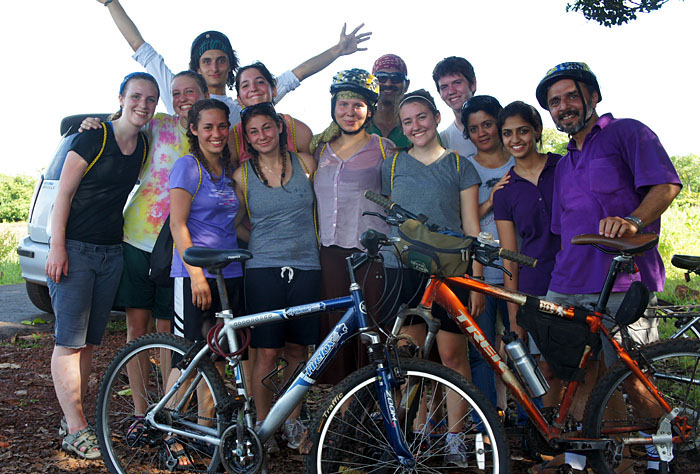 A group of students on the fall 2011 India Program, including Kelsey Gorman (second from left), during a weekend bicycling excursion.
A group of students on the fall 2011 India Program, including Kelsey Gorman (second from left), during a weekend bicycling excursion.
The Tanzania Program gave Hamel her first taste of field research. Since she majored in both biology and sociology/anthropology, she had a choice to make in picking a topic for her independent project. “The biology majors got to go on safari every day [for their fieldwork],” she said, “so I decided that I wanted to do that, and I ended up studying insect communities in elephant dung.”
Her fieldwork took her to a variety of locations in Tarangire as she collected dung samples, documented and analyzed them, and correlated the abundance of insects in the samples with their locations relative to water sources. The experience “solidified my interest in ecology,” Hamel said, and when she returned to Lake Forest she did her senior thesis project on insects.
Looking ahead to this fall, Hamel has been in touch with the program’s Visiting Faculty Director, biologist Memuna Khan from Ripon College, and will be involved in assisting students as they work on their projects during the fieldwork phase of the semester.
For both Gorman and Hamel, returning to their program sites and reconnecting with their host families and other friends was a major attraction of the Student Alumni Fellow position.
“I’m excited just to experience the culture again and help the students through that process,” Hamel said. “I think it will be really rewarding to work with them.”
While Gorman will draw on her experience in India to help the current students, that doesn’t mean she won’t continue her own personal growth this fall. “I think any time I’m in India will be a learning process for me,” she noted. “There’s always something new to see or experience.”
Links:






